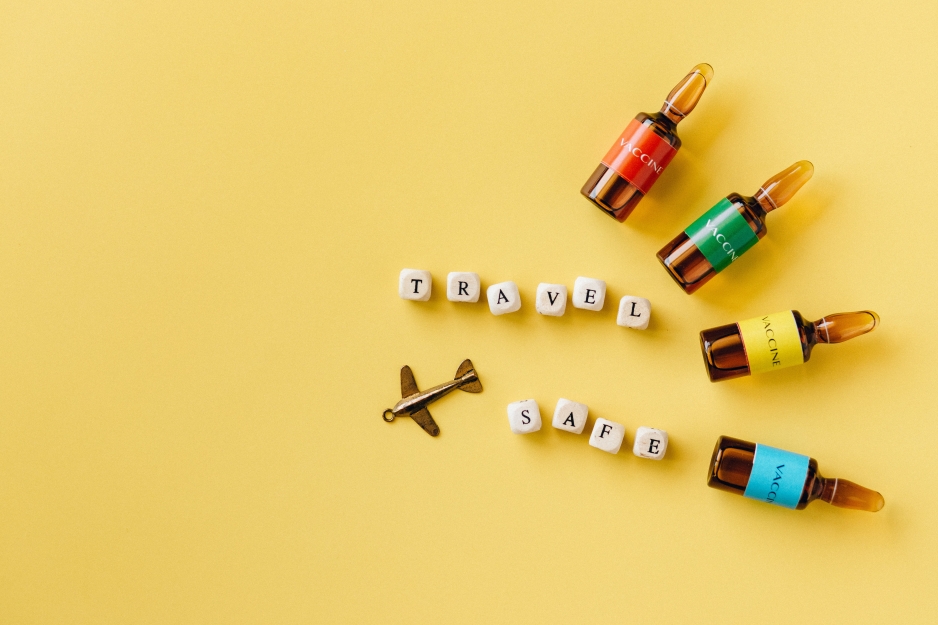Taking a trip, whether a weeklong vacation or just a weekend getaway, is a great way to decompress, refresh and celebrate. But anyone who has had a trip go awry because of health issues can tell you that a dream vacation can become a nightmare when you don’t feel well. Whether it’s food poisoning, allergies or misplaced medication, health issues can derail any trip. Luckily, there are ways to make sure that your travels are smooth sailing.
Eating can be a big part of travel. Whether you enjoy fine dining or food trucks, it’s important to enjoy what you eat while on vacation. “I often advise my patients not to worry about losing weight while on vacation,” said Rachel Van Den Top, Clinical Dietitian. “I think your mind should be focused on the exciting things you’ll be doing, new places you’ll see and the yummy foods to try rather than the number on the scale during vacation.”
Rachel also warns travelers to be on the lookout for what she calls, “travel tummy.” That can be anything from inconvenient abdominal discomfort or more serious travelers’ diarrhea. “This can be a result of a difference in climate, different sanitary practices or simply the stress from travel. If you know you’re going to an area where the tap water is contaminated, it is especially important to plan ahead and have bottled water available. You also will want to avoid drinks with ice in them, as the ice may be made from the contaminated water,” Rachel explained. Researching beforehand can help you learn if an area has water that you should avoid or if you need to be vigilant about unsanitary food practices. This will help you avoid travel tummy as well as more serious conditions such as hepatitis A or typhoid, or illnesses caused by bacteria,parasites and viruses.
Travelers should also be on guard against dehydration, which can pose serious risks. Even in areas where water may be contaminated, it’s important to stay well-hydrated, especially in warm climates. “Do your best to have a water bottle on you at all times or bottled water nearby. You can set a timer on your phone to remind you at a certain time of the day to catch up on water intake,” suggested Rachel. “Since you will be eating different food than you are used to, and in a different routine, it is important to drink adequate water to keep your bowel movements regular.” In areas where water may be contaminated, you will want to drink bottled water or use a water purification method.
Always keep your medications with you when traveling.
Although airlines strive to make sure everyone’s checked baggage arrives where it should be on time, everyone knows someone who has lost luggage — keep your medications in your personal item or in your carry-on luggage to prevent any issue with lost baggage. Medications should be kept in their original, labeled containers from the pharmacy. Remember to pack a cooler for medications that have to be kept cold, like insulin.
If you forget to get your medications filled prior to departure, or your medicine is lost or damaged, contact a pharmacy in your travel area. “Typically, when traveling within the United States, most prescription medications can be transferred over the phone to a pharmacy of your choosing. Special rules and restrictions do apply, especially for controlled or DEA scheduled medications, that may make this process more complicated. Be mindful, higher copayments may also occur when filling at an out-of-network pharmacy,” said Stephanie.
These suggestions can help you avoid getting ill on your trip, but what if you have medication that you need to continue taking during your travels? Pharmacist Stephanie Magbuhat, PharmD, suggested having all prescription medications ready well before your departure date. “The most important piece of advice I can offer is to plan ahead,” said Stephanie. “Long before your travel date approaches, call your preferred pharmacy and make sure you have refills on all your medications, and confirm you will have enough to get you through the entirety of your trip, as well as a little extra to account for any flight or weather delays.” Most insurance companies will allow at least one vacation override per medication per calendar year if the refill dates don’t quite line up. “Just call your pharmacy with your specific travel dates, and they will happily call your insurance company if needed,” added Stephanie.
It’s not uncommon to throw routine out the window when traveling, but remember that medications must be taken as prescribed. “Remember which medications need to be taken with food and which need to be taken on an empty stomach. Be mindful that some medications shouldn't be mixed with alcohol,” said Stephanie. “If you are traveling across multiple time zones, or fear you can't replicate your normal routine, feel free to call your pharmacist for specific recommendations.”
If traveling internationally, you will need to take additional steps to prepare. Some foreign countries may have additional travel requirements, such as required or recommended vaccines or medications for protection against common pathogens. Some prescription medications may not be available, or may even be illegal, in some countries. “To be sure the medications you are traveling with are permitted, and you have all the correct documentation, you should always check with the embassy or consulate in that county prior to departure, especially if traveling abroad with DEA scheduled medications,” advised Stephanie. For specific guidelines, the CDC’s website is a reliable source of information, or ask your primary care provider for guidance.
Depending on your destination, you may not have access to the same over-the-counter medications that you do at home. It may be worthwhile to pack your own, especially if you have seasonal allergies, a sensitive stomach or are prone to headaches. Stephanie suggested, “In addition to basic first aid supplies, your travel kit should also include medications for the following ailments: diarrhea, heartburn, allergies, motion sickness, pain and fever relief, constipation and insect bites. If you are interested in specific recommendations, contact your pharmacist for a personalized list geared toward your destination and in accordance with your prescription medications to assure there are no conflicting drug interactions.”
If you’re flying into a different time zone, you may also experience jet lag, which is a temporary sleep problem caused by your body’s circadian rhythms — or internal clock — not adjusting to your new destination as quickly as you travel. Symptoms include daytime fatigue, upset stomach, difficulty staying alert and a general unwell feeling. The farther your trip takes you, the more severe your symptoms may be. While there is no single, surefire way to prevent jet lag, there are steps you can take to reduce the likelihood of experiencing it or reduce your symptoms. You can start by getting plenty of rest before your trip, since starting your trip already sleep deprived will make symptoms worse. Try to sleep on the plane if it is night where you’re going but try to stay awake if it’s daytime at your destination. You can also try to gradually adjust your schedule before you leave — if your trip will take you east, go to bed an hour earlier each night a few days before you depart. If flying west, reverse it and go to bed one hour later. Once you reach your destination, keep your routine with the local time, including when you go to bed and get up, as well as when you eat your meals. Staying hydrated can also help counter the symptoms of jet lag.
Whether you’re traveling around the globe, across the country or just down the road, your getaway should make you feel awesome, not awful. Taking these steps can help you ensure that you don’t get a case of travel tummy, suffer from too much jet lag or just wish you were back home.



